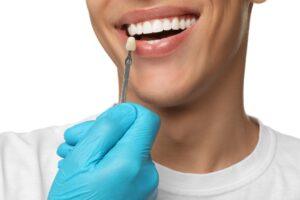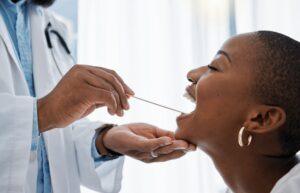Regular oral cancer screenings are integral to upholding optimal oral health and detecting potentially life-threatening conditions at an early stage. Oral cancer, capable of impacting various areas such as the lips, tongue, cheeks, and throat, stands as a severe ailment that, when left unchecked, can lead to fatal consequences. These screenings are imperative for all individuals, extending beyond those deemed high-risk.
Early detection of oral cancer drastically boosts treatment success rates and survival odds. Per the American Cancer Society, the 5-year survival rate for early-detected oral cancer stands at around 84%. Regrettably, numerous cases remain undiagnosed until the cancer advances, hindering treatment efficacy. This is why a regular oral cancer screening should be a part of your routine dental care.
What Is an Oral Cancer Screening?
An oral cancer screening, a quick and painless procedure conducted by a dentist or healthcare provider, aims to identify any signs of cancer or precancerous conditions in the oral cavity. The objective is to detect oral cancer in its early and most manageable phase. Throughout the examination, your dentist will carefully assess your mouth, throat, and adjacent areas for any irregularities that might suggest the existence of cancer.
Oral cancer screenings are recommended for everyone, but they are particularly important for individuals who have risk factors such as tobacco use, heavy alcohol consumption, excessive sun exposure to the lips, or a history of oral cancer. The frequency of screenings may vary depending on your risk level, but most dentists include an oral cancer screening as part of your regular check-up, typically once or twice a year.
The role of your dentist in early detection cannot be overstated. Dentists are frequently the initial to detect alterations in the mouth that might suggest oral cancer. They possess the expertise to identify even the most delicate indicators that could escape the patient’s attention. Routine dental check-ups, including oral cancer screenings, are crucial for early disease detection, significantly influencing timely intervention.

What to Expect During the Screening
During your oral cancer screening, our dentist will perform both a visual and physical examination to check for signs of cancer.
- Visual Examination: The dentist will carefully inspect your lips, gums, tongue, the roof of your mouth, the floor of your mouth, and the inside of your cheeks for any visible signs of cancer. This may include looking for sores, red or white patches, or other abnormalities. The dentist may also use a special light or dye to help detect areas of abnormal tissue that are not visible to the naked eye.
- Physical Examination: In addition to the visual examination, the dentist will feel the tissues in your mouth and around your jaw and neck to check for lumps or other abnormalities. This step is crucial because some signs of oral cancer are not visible but can be detected by touch.
- Additional Tests: If your dentist finds anything suspicious during the screening, they may recommend additional tests. These could include a biopsy, where a small sample of tissue is taken and sent to a lab for analysis, or imaging tests like X-rays, MRI, or CT scans to get a more detailed view of the area.
Signs and Symptoms Dentists Look For
During an oral cancer screening, our team will be on the lookout for several common signs and symptoms of oral cancer:
- Sores that don’t heal: Persistent sores in the mouth that don’t heal within a few weeks could be a sign of oral cancer.
- Lumps or thickening: Any unusual lumps, bumps, or thickened areas in your mouth or neck should be examined further.
- White or red patches: Patches of red or white in the mouth, especially if they don’t go away, can be indicative of precancerous conditions.
- Persistent pain or numbness: Unexplained pain or numbness in your mouth, face, or neck should be reported to your dentist.
- Problems moving your jaw or tongue or swallowing: These symptoms could suggest that the cancer has spread, and immediate evaluation is necessary.
It’s important to report any of these symptoms to your dentist as soon as you notice them. While these signs don’t necessarily mean you have oral cancer, they warrant further investigation.
The Benefits of Regular Oral Cancer Screenings
The most significant benefit of regular oral cancer screenings is early detection. When oral cancer is detected early, there is a higher likelihood for successful treatment. This drastically increases the chances of survival. Early detection also often means that the treatment can be less invasive, with a faster recovery time.
Regular screenings can also prevent the need for more extensive treatment. For example, if a precancerous lesion is detected early, it may be possible to remove it before it develops into full-blown cancer. This proactive approach can save patients from undergoing more aggressive treatments like surgery, radiation, or chemotherapy.
Moreover, knowing that you are regularly screened for oral cancer can provide peace of mind. It allows you to stay on top of your oral health and reduces the anxiety that can come from worrying about undetected health issues.
What to Do If Something Abnormal is Found
If your dentist finds something abnormal during your oral cancer screening, don’t panic. Most of the time, these abnormalities are not cancerous, but they still require further evaluation to be sure. Your dentist will likely refer you to a specialist, such as an oral surgeon or a head and neck cancer specialist, for a more detailed examination.
The next steps may involve additional tests, such as a biopsy, to determine whether the abnormal area is cancerous. If cancer is detected, your healthcare team will work with you to develop a treatment plan tailored to your needs. This plan may include surgery, radiation therapy, chemotherapy, or a combination of these treatments, depending on the stage and location of the cancer.
Follow-up care is also essential. Even after treatment, regular check-ups and screenings are necessary to ensure that the cancer has not returned and to monitor your overall health.
Schedule an Appointment Today
To learn more about our oral cancer screening services, call our team at Riverside Dental in Watertown, WI, at (920) 262-2176 to schedule an appointment. Your oral health is our priority, and we are here to support you every step of the way.



